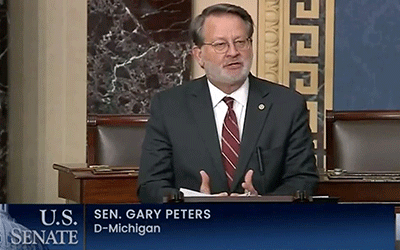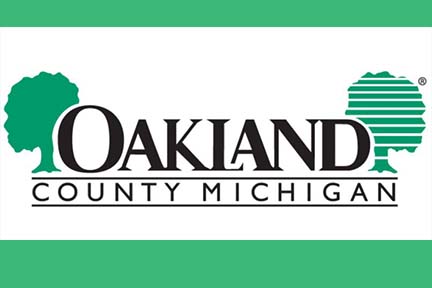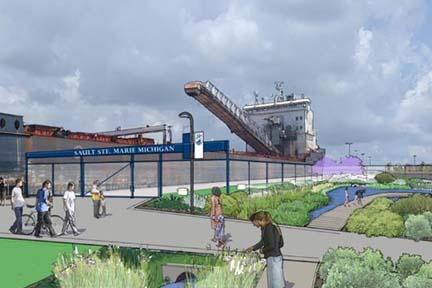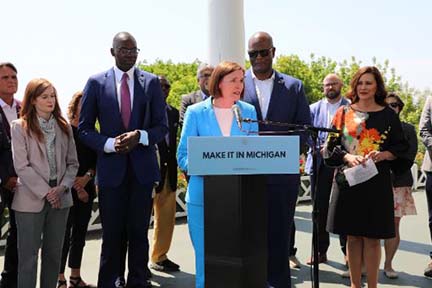
Supporting disaster survivors across Michigan
|
|||
|

|
|||
|

Pontiac, Mich. – Oakland County Executive Dave Coulter has released the American Rescue Plan Act (ARPA) Annual Report for 2023, detailing how Oakland County is investing $244 million ARPA dollars from the federal government into the community.
As required by ARPA, Oakland County presented its Recovery Plan Performance Report for the period ending June 30, 2023. The county has designated nearly $146.5 million of the ARPA funds for residents, businesses, schools, and non-profit organizations and has delivered more than $60.5 million to recipients to date.
County executive administration, in partnership with the Board of Commissioners (BOC), is funding projects that reflect Oakland County’s mission, vision and values while addressing the most significant challenges facing residents with a special focus on mental health, housing and economic hardships affecting both businesses and families. Among the most significant ARPA investments are:
When deciding how, when, and where to invest ARPA funding, county leaders used the Strategic Framework with the goal to strengthen programs and services that were meeting the needs of residents before the pandemic. All funds must have an awardee by Dec. 31, 2024, and be spent by Dec. 31, 2026. The county is on track to meet these deadlines.
To read in more detail about the ARPA-invested programs, services, and initiatives, visit oakgov.com/arp.


FOR IMMEDIATE RELEASE August 8, 2023 Contact: [email protected]
Gov. Whitmer Awards Grants to Fund Infrastructure Projects that will Support More than 1,500 Jobs in Chippewa and Oakland Counties
LANSING, Mich – Governor Whitmer has announced two state Transportation Economic Development Fund (TEDF) grants that will support a total of 1,525 new jobs and $3.5 billion of private investment in Chippewa and Oakland counties, Gov. Gretchen Whitmer announced today.
“These transportation economic development investments will create more than 1,500 good-paying jobs and make communities across Michigan better places to live, work, and invest,” said Governor Whitmer. “The improvements in Oakland County will improve the flow of traffic around the forthcoming GM plant in Orion Township and the upgrades around the Carbide Dock Port in the Sault will ensure the flow of commerce and tourism through a major port in the UP can continue. Let’s keep working together on investments that make a real difference in people’s lives, create good-paying jobs, and grow the economy.”
The state Transportation Economic Development Fund (TEDF) grant helps finance public highway, road, and street projects that are critical to the movement of people and products, and getting workers to their jobs, materials to growers and manufacturers, and finished goods to consumers.
Grant Recipient: Oakland County Road Commission
General Motors is a global company with a focus on advancing an all-electric future. At the heart of this strategy is the Ultium battery platform, which will power everything from mass-market to high-performance vehicles. General Motors, its subsidiaries, and its joint venture entities, sell vehicles under the Chevrolet, Buick, GMC, Cadillac, Baojun, and Wuling brands. To deliver the Ultium battery to the global GM portfolio, the company began searching for a site able to provide the needed infrastructure for their $3.47 billion investment.
The Orion Township plant location was selected after extensively reviewing expansion options in several states, with factors including land availability, local and state government support, available labor pool, and infrastructure. As part of discussions with state and local officials, the promise of infrastructure support was a strong factor in the overall decision to invest at the Orion Assembly Plant.
Road conditions around the Orion Assembly Plant posed a safety risk to anyone who uses the roads in the Lake Orion/Auburn Hills area. A permanent fix was needed, as the plant expansion will generate significant increases in commercial and passenger traffic with 1,500 new jobs created by 2026. In addition to potential safety risks presented by deteriorating road conditions, GM expressed concerns regarding material financial impact due to damages and delays sustained by suppliers, distributors, and others using the area roadways, as well as possible damage to product leaving the facility.
“On a project of this size and significance, collaboration is key and local, state and federal partners came together to make sure this transformational General Motor’s project in Orion Township moves forward smoothly,” said Oakland County Executive Dave Coulter. “This plant will be a catalyst for the mobility industry of the future in Michigan and the region and the improvements in the infrastructure around the facility are essential to ensuring a safe and welcoming workplace for the thousands of people who will be employed at the plant.”
“Metro-Detroit is the home of America’s auto industry, where it is especially important that the quality of our roads keeps pace with the quality of our cars,” said state Senator Jeremy Moss (D-Southfield). “This grant to the Oakland County Road Commission does both, helping improve our roads and supporting General Motors’ new electric battery production, bringing significant investment and creating more jobs in our region.”
“Investing in site readiness, making the roads safer for all — these are important tools in our economic development toolbox and I am happy to see it yield more jobs for Oakland County,” said state Representative Jason Hoskins (D-Southfield), Chair of the House Economic Development and Small Business Committee.
“The MDOT grant coming to Oakland County is going to provide permanent infrastructure enhancements — including road improvements — to the community,” said state Representative Brenda Carter (D-Pontiac). “Plus, the funding for this project will help provide the necessary support for the GM electric vehicle plant in Orion to keep moving forward, which means further economic growth for the area. It is clear that Michigan is investing in initiatives that will ensure we remain a premier leader in the automotive industry and a forerunner in the innovative technology sector. When Michigan invests in manufacturing, we invest in people.”
“Dependable roads and infrastructure are a critical piece of successful operations at Orion Assembly,” said Mike Trevorrow, GM’s vice president, North America Manufacturing. “This grant will help rebuild roads which will benefit GM, our suppliers and the residents in the community.”
With TEDF funding and $7 million in Fiscal Year 2023 U.S. House Appropriations Committee Community Project Funding to go towards the project, the Road Commission of Oakland County, in partnership with Orion Township, will rebuild the road, milling down to the subbase, and replacing concrete curb and gutter on three roads surrounding the GM Orion Assembly Plant. The project limits include Brown Road between Jamm Road and Giddings Road; Giddings Road from Brown Road to Silverbell Road; and Silverbell Road from Giddings Road to M-24. Additional work on Brown Road includes the addition of a center left-turn lane from North Atlantic Boulevard to just west of the intersection at Brown Road and Giddings Road. This will create a consistent five-lane cross section on this project segment of Brown Road. The TEDF Category A grant program will provide a total of $5 million in funding across the three project areas.
Grant Recipient: City of Sault Ste. Marie
The Carbide Dock Port in Sault Ste. Marie is currently being reconstructed after having been decommissioned in 2017. As a result of the dock reconstruction, Northern Sand and Gravel, Central Marine Logistics/Inter Ship, and Morton Salt will be expanding their employment and services.
Northern Sand and Gravel is a ready-mix concrete and aggregate manufacturer based in Sault Ste. Marie planning to use the reconstructed Carbide Dock to receive aggregate materials. They will need all-season roads to deliver the aggregate material from the dock to their plant on 3-Mile Road and plan to add two jobs.
Central Marine Logistics is a coastal and Great Lakes passenger transportation company based in Indiana with a location in Cooks, Mich. They plan to use the reconstructed Carbide Dock for Great Lakes cruise ships and bulk cargo carriers, both of which require all-season roads to transport fuel, waste, and supplies to and from the docked ships. The dock access will increase the number of cruise ships stopping in Sault Ste Marie, bringing an additional 2,900 tourists per year. From the dock tourists will have the opportunity to be transported to various locations around the Upper Peninsula, including downtown Sault Ste. Marie, Tahquamenon Falls, and casinos. The company reports that 90 percent of these visitors are not Michigan residents.
Morton Salt is an international mining company, which provides road salt to road agencies in the upper peninsula. Currently, the salt is being transported by truck from a mine in Marinette, Wis. Once the dock and road work are complete the company will begin shipping salt from a mine in Detroit, unloading the shipments at the new dock, and transporting the materials to customers, requiring an all-season route from the dock to I-75. This change is expected to add 25 new jobs.
“Improved road infrastructure is important for safe, efficient, and timely ice control salt deliveries to our customers at MDOT,” said Leena Kaleva, manager of Bulk Distribution Services in Ontario and the Great Lakes, Morton Salt Inc.
The City of Sault Ste. Marie will extend Ord Street from Portage Avenue north to the Carbide Dock and Alford Park. The City of Sault Ste Marie will also extend Salmon Run Way from the eastern terminus at Lake Superior State University Center for Freshwater Research and Education to the Ord Street extension. Additionally, Ord Street will be resurfaced from Portage Street to Easterday Avenue. All roads would be constructed to all-season standards, allowing trucking of heavy materials from the dock to I-75. The TEDF Category A grant program will provide $845,898 of funding to the project.
“The Carbide Dock Port and connecting the Easterday Avenue truck route will be economic drivers for the City of Sault Ste. Marie. With the help of MDOT, through their Economic Development Category A funding program, we will be able to finish Salmon Run Way and extend Ord Street to complete an all-season haul route in the Upper Peninsula,” said Brian Chapman, city manager, City of Sault Ste Marie. “This funding is critical not just for the city, but for multiple counties that receive salt shipments, aggregate, and benefit from cruise ship tourism. Having a roadway of this caliber will increase our import/export power and combat supply chain issues.”
About Transportation Economic Development Fund Grants Enacted in 1987 and reauthorized in 1993, TEDF “Category A” or “Targeted Industries Program” grants provide state funding for public roadway improvements that allow road agencies to respond quickly to the transportation needs of expanding companies and eliminate inadequate roadways as an obstacle to private investment and job creation. Eligible road agencies include the Michigan Department of Transportation, county road commissions, cities, and villages. More information about the program is available online at www.Michigan.gov/TEDF. |

Waterford Twp., Mich., – The Misty Blues, an all-women skydiving team, is returning to Oakland County International Airport (OCIA) to headline its 36th annual Open House & Air Show on Sunday, Aug. 6 from 9 a.m. to 4 p.m. in Waterford. Event admission and parking are free.
The air show runs from 1:30 to 3 p.m. Attendees are encouraged to arrive early. Joining the Misty Blues will be professional aviators soaring above the crowd, executing aerobatics:
On the ground, the Yankee Air Museum will present historical exhibits on the aircraft and vehicles from WWI, WWII, and the Vietnam War, as well as the people who built and piloted them. The museum will offer hands-on activities including sitting in a real cockpit. Attendees can get a closer look at the McKinnon G21G Goose, which won the Experimental Aircraft Association’s 2022 Gold Lindy Award and was restored by Bloomfield resident Bob Redner.
For $45 per rider, attendees can board an airplane or helicopter for a ride through the skies, too.
Oakland County Parks will provide inflatable playscapes and face painting while Oakland County Health will host a health and safety fair with free emergency preparedness kits, lock boxes and more. Other vendors include the 99’ers, Civil Air Patrol, DCT Aviation, District 11-A2 Lions Club, Eastern Michigan University, FAA FAAST Team, Face Flair, Girl Scouts of Southeastern Michigan, IFL, Joe’s Army Navy, Masons Child ID Program, Maven at Midfield, Michigan Helicopters, Oak Management, Michigan Department of Health and Human Resources Foster Care Program, Oakland County Sheriff’s Department, Operation Good Cheer, Premier Jet, Royal Air Aviation, Tuskegee Airmen, U.S. Army, U.S. Marine Corps, U.S. Navy, Warbirds of Glory, Waterford Fire/EMS and Police Departments, Waterford Senior Center, and Western Michigan University College of Aviation.
Sponsoring the 36th Annual Open House & Air Show are Ajax Paving; Williams International; Vibe Credit Union; M1 Concourse; Crosswinds Aviation; Pentastar Aviation; LL Johns & Associates; Corporate Eagle; Mead & Hunt; Kris Haase, DPM; White Pine Helicopters; and Oxus America.
OCIA is located at 6500 Patterson Parkway in Waterford Twp. For information, visit oakgov.com/community/airports/open-house-air-show or facebook.com/OakGovAirport.


FOR IMMEDIATE RELEASE July 31, 2023 Contact: [email protected]
Gov. Whitmer Signs ‘Make it in Michigan’ Budget Balanced, bipartisan FY24 budget lowers costs, grows the economy, and delivers on kitchen-table issues
LANSING, Mich. — Today, Governor Gretchen Whitmer signed a balanced, bipartisan general government state budget for Fiscal Year 2024 to grow the economy, lower costs, deliver on kitchen-table issues, and help anyone “Make it in Michigan.”
The FY24 budget, when combined with the education budget previously signed by the governor, lowers costs on health care, preschool, meals for kids, higher education, housing, and workforce training. Additionally, the fiscal year 2024 budget will help fix bridges, replace lead pipes, and protect public safety.
“The Make it in Michigan budget will lower costs, deliver on the issues that make a real difference in people’s lives, and help anyone ‘make it’ in Michigan,” said Governor Whitmer. “The budget protects public safety and improves access to health care, ensuring people feel safe in their neighborhood and have access to quality, affordable care that meets their needs. It supports our service members and veterans, connecting them and their families with the resources they deserve, and will build up all kinds of infrastructure so every family has safe roads, clean water, and affordable housing. Finally, it continues powering our economic development efforts to create tens of thousands of good-paying jobs, and bring manufacturing and supply chains home to Michigan. The Make it in Michigan budget builds on our economic momentum, and will help us build a brighter future for everyone who calls this great state home.”
“The budget signed into law by Governor Whitmer today funds programs and services that benefit residents across the state and saves money for a rainy day,” said State Budget Director Christopher Harkins. “This budget builds on the Governor’s previous success of delivering targeted tax relief and delivers investments to improve the lives of the people of our great state.”
The FY24 budget totals $81.7 billion, including a general fund total of $15.2 billion.
Fiscally Responsible, Balanced Budget The budget deposits $200 million into the Budget Stabilization Fund, or ‘rainy day fund,’ bringing the balance to nearly $2 billion by the end of FY24, an all-time high.
Public Health – Strengthening Families The budget makes critical investments to ensure Michigan families can access the care they need:
Public Safety – Keeping Communities Safe To keep families and communities safe and ensure police officers and first responders have the funding and resources they need, the budget invests:
Rebuilding Infrastructure From 2019 through the end of this construction season, nearly 20,000 lane miles of road and 1,400 bridges will be fixed. This budget continues to fix roads, replace lead pipes, build housing, and more:
Roads, Bridges, Transit, Electrification
Housing
Water, Parks, Agriculture, Environment
Economic Development To create good-paying jobs and bring manufacturing and supply chains home, the budget powers economic development efforts, including:
Additionally, $26.7 million is included to provide a 5% increase (4% ongoing and another 1% ongoing to communities that obligate all available ARP dollars) in statutory revenue sharing to help counties, cities, villages, and townships; and new dedicated statutory revenue sharing funds, 2% one-time, for public safety initiatives; plus, an additional $64 million over current year funding in constitutional revenue sharing payments.
|


FOR IMMEDIATE RELEASE July 27, 2023 Contact: [email protected]
Governor Whitmer Makes Appointments to Boards and Commissions
LANSING, Mich. — Today, Governor Gretchen Whitmer announced the following appointments to the Elevator Safety Board, Michigan Unarmed Combat Commission, Water Use Advisory, and Michigan Council for Rehabilitation Services.
Today’s appointees represent Michigan’s young professionals, communities of color, seniors, and more. The appointees announced this week build on Governor Whitmer’s work to ensure appointees reflect Michigan’s diverse population. Sixty percent of appointees are women or people of color, and the Whitmer cabinet is the most diverse in Michigan history.
Elevator Safety Board
Joshua Jacobs, of Leroy, is a serviceman for Elevator Services in Grand Rapids since 2022 and has over 24 years of experience in the elevator industry. He is a licensed Elevator Journeyperson and Elevator Contractor and completed journeyperson training with the National Elevator Industry Education Program. Mr. Jacobs is reappointed to represent manufacturers of elevators used in this state for a term commencing July 27, 2023, and expiring July 22, 2027.
The Elevator Safety Board promulgates rules and prepares examinations in relation to contractor licenses. The Board also conducts hearings to determine whether an elevator contractor license or certificate of competency or commission should be suspended or revoked.
This appointment is subject to the advice and consent of the Senate.
Michigan Unarmed Combat Commission
Byron Osbern, of Detroit, is a Business Representative for IBEW Local 58. Additionally, he has also held positions on the Detroit Charter Commission 2018, Detroit Board of Ethics, Detroit Mayors Workforce Development Board, and the Detroit Brownfield Redevelopment Authority Community Council. Mr. Osbern is reappointed to represent the general public for a term commencing July 27, 2023, and expiring June 5, 2027.
The Michigan Unarmed Combat Commission is the successor to the Michigan Boxing Commission and is responsible for the regulation of professional boxing and mixed martial arts. The Commission and the Department of Licensing and Regulatory Affairs are vested with management, control, and jurisdiction over all professional boxing, professional or amateur mixed martial arts, or unarmed combat contests or events conducted in this state.
These appointments are subject to the advice and consent of the Senate.
Water Use Advisory Council
Frank Ettawageshik, of Harbor Springs, is a founding member of Michigan Tribal Advocates and serves as the Executive Director of United Tribes of Michigan. He has a long history of leadership within the tribal community, first as a member of the board, vice chairman, and eventually as Chairman of the Little Traverse Bay Bands of Odawa Indians. Mr. Ettawageshik is reappointed to represent Indian Tribes, for a term commencing July 27, 2023, and expiring February 26, 2027.
Dave Hamilton, of Haslett, is a retired water management professional having most recently served as a senior policy advisor for The Nature Conservancy. He also held numerous positions in the Michigan Department of Environmental Quality over the course of his career all relating to water use and management. He holds a Bachelor of Science in Agricultural Engineering from MSU and a Master of Science in Civil Engineering, Water Resources from MIT. Mr. Hamilton is reappointed to represent statewide conservation organizations, for a term commencing July 27, 2023, and expiring February 26, 2027.
Katy Lindstrom, of Saline, is a Senior Environmental Engineer at Barr Engineering Co. She holds a Bachelor of Science in Environmental Engineering from Michigan Tech, and a Master of Science in Hydrologic Science and Engineering from the Colorado School of Mines. Ms. Lindstrom is appointed to represent professional hydrologists and hydrogeologists, as defined in section 32706c, with hydrogeology field experience, for a term commencing July 27, 2023, and expiring February 26, 2027. She succeeds James Nicholas, whose term has expired.
Dave Maturen, of Vicksburg, is currently the president of the Michigan Lakes & Streams Association. He is also a former member of the state house representing the 63rd district from 2015 to 2018 holds a bachelor’s degree in business administration and a Master of Public Administration degree from Western Michigan University. Mr. Maturen is appointed to represent a statewide riparian landowners association, for a term commencing July 27, 2023, and expiring February 26, 2027. He succeeds Mike Gallagher, whose term has expired.
Patrick J. Staskiewicz, P.E., of Grand Haven, is the Public Utilities Director at Ottawa County Road Commission. He holds a Bachelor of Science, Civil and Environmental Engineering from Michigan State. He also holds a Professional Engineer license in the state of Michigan and Waterworks System Operator licenses from EGLE: S-1 (water distribution), D-2 (limited treatment). He has over 30 years of experience in municipal drinking water and wastewater systems and is the Past-Director of the Michigan Section, American Water Works Association (AWWA) and is a Past-Vice-President of AWWA. Mr. Staskiewicz is reappointed to represent municipal water suppliers, for a term commencing July 27, 2023, and expiring February 26, 2027.
The Water Use Advisory Council advises the Department of Environmental Quality, Department of Natural Resources, and Department of Agriculture and Rural Development on the State’s Water Use Program, which includes the following major elements: Great Lakes Compact; water withdrawal; and water use conflict.
These appointments are not subject to advice and consent of the Senate.
Michigan Council for Rehabilitation Services
Margi Williams, of Mattawan, is the Managing Partner and Career/Transition Employment Specialist at Diversified Career Services. She has a bachelor’s of business administration from Baker College, and a Master of Science in Industrial and Organizational Psychology from Baker College. Ms. Williams is appointed to represent business, industry or labor for a term commencing July 27, 2023, and expiring December 31, 2024.
Kelsey Hockaday, of Midland, is the Quality Assurance Manager at the Disability Network of Mid-Michigan. She holds a Bachelor of Science in History from Northern Michigan University. Ms. Hockaday is appointed to represent business, industry or labor for a term commencing July 27, 2023, and expiring December 31, 2024.
Kathryn Flagstadt, of Marquette, is retired as the Site Manager at Michigan Rehabilitaion Services. She is a member of the State Employee Retirees Association, and the Marquette County Aging Services Advisory Committee. She holds a Bachelor of Science in Business Administration and Management from Northern Michigan University and a Master of Social Work from Michigan State University. Ms. Flagstadt appointed to represent vocational rehabilitation programs for a term commencing July 27, 2023, and expiring December 31, 2025.
The Michigan Council for Rehabilitation Services reviews, analyzes, and advises Michigan’s rehabilitation programs and services, and advises the department director and Governor. The Council works in partnership with Michigan Rehabilitation Services (MRS) and the Michigan Department of Licensing and Regulatory Affairs’ Bureau of Services for Blind Persons (LEO-BSBP).
These appointments are not subject to the advice and consent of the Senate.
|